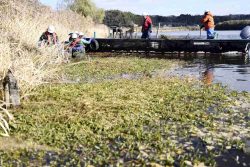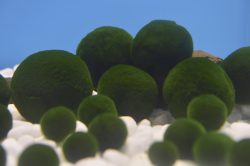16:24 JST, January 8, 2025
LONDON (AFP-Jiji) — Conservationists in the U.K. and Portugal hailed on Dec. 28 a breeding program which has saved two critically endangered snail species from extinction and spurred the release of 1,329 on a remote Atlantic island.
The Desertas Island land snails were believed to be extinct. They had not been spotted for more than a century, until conservationists rediscovered a small population on Deserta Grande island, close to Madeira, in 2017.
Thought to be the last of their kind in existence, the team from Portugal’s Institute of Forests and Nature Conservation (IFCN) sent 60 of the pea-sized snails to Chester Zoo in northwest England.
There, specialists recreated the perfect conditions for the snails to thrive and successfully bred them for the first time ever in human care, according to the zoo.
Snails were also then sent from Chester to two other leading European conservation zoos — in Bristol, western England, and Beauval, northern France — where their numbers multiplied.
Following these successes, which are being seen as a template for other conservation efforts, 1,329 of the snails have now been returned to Bugio Island — neighboring Desertas Island — in a landmark reintroduction.
The small protected island in the North Atlantic was selected because it had eradicated invasive goats, rats and mice — the main threats which almost wiped out the snails.
“When the snails first arrived in Chester the very future of the species was in our hands,” said Gerardo Garcia, Chester Zoo’s head of ectotherms, calling it “a huge responsibility.”
“These snails really were on the edge of extinction and the fact that we’ve now been able to give them a chance of making a comeback is testament to the efforts of many people,” he added.
Each of the snails now on Bugio has been individually color marked so they can be carefully monitored on the island.
If the reintroduction proves successful, many more snails will join them to help give the species a further boost.
“These snails are incredibly precious,” IFCN conservationist Dinarte Teixeira said.
He said the IFCN’s species recovery plan had involved habitat restoration, pest control and field surveys followed by the breeding program.
“The Desertas islands are the only place in the world where they can be found and so we’re striving to do everything we can to give them the best possible chance for the future.
“For 100 years we thought they’d gone forever. But now there’s new hope.”
Top Articles in Science & Nature
-

Japan Institute to Use Domestic Commercial Optical Lattice Clock to Set Japan Standard Time
-

Japan to Face Shortfall of 3.39 Million Workers in AI, Robotics in 2040; Clerical Workers Seen to Be in Surplus
-

Record 700 Startups to Gather at SusHi Tech Tokyo in April; Event Will Center on Themes Like Artificial Intelligence and Robotics
-

iPS Treatments Pass Key Milestone, but Broader Applications Far from Guaranteed
-

iPS Cell Products for Parkinson’s, Heart Disease OK’d for Commercialization by Japan Health Ministry Panel
JN ACCESS RANKING
-

Japan PM Takaichi’s Cabinet Resigns en Masse
-

Japan Institute to Use Domestic Commercial Optical Lattice Clock to Set Japan Standard Time
-

Israeli Ambassador to Japan Speaks about Japan’s Role in the Reconstruction of Gaza
-

Man Infected with Measles Reportedly Dined at Restaurant in Tokyo Station
-

Videos Plagiarized, Reposted with False Subtitles Claiming ‘Ryukyu Belongs to China’; Anti-China False Information Also Posted in Japan






















